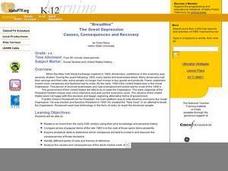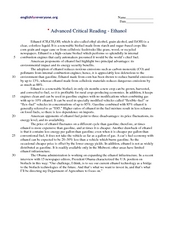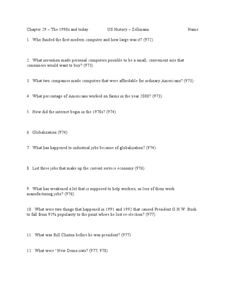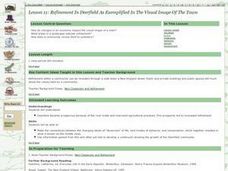Curated OER
The Industrial Age in America: Sweatshops, Steel Mills, and Factories
Learners investigate the working conditions during the Age of Industrialization. They research how workers reacted to the conditions and discuss the results of labor movement.
Curated OER
Trekking to Timbuktu: The Geography of Mali -Teacher Version
Students investigate the geography of Mali. They locate Mali on a satellite map, explore various websites, describe the landscape and climate, label a map, and write an essay about the Niger Riger.
Curated OER
Alexander Hamilton and the Roots of Federalism
Explore the origin of political parties in the United States. Learners work in groups to read and analyze copies of the "Report on Manufactures" written by Alexander Hamilton. Then, they complete a worksheet comparing the Federalists to...
Curated OER
Immigration
This 3-day immigration study draws on historical trends and current events. A worksheet accompanies initial research on one group's U.S. immigration history, giving opportunity for collaborative learning through sharing findings. Groups...
Curated OER
Flush It! Throw It! Out of Sight, Out of Mind!
Students describe disposal procedures by reviewing water and solid waste disposal cycles and what happens when one step is omitted. They examine the connection between industry and human health.
Curated OER
Cotton And Child Labor
Eleventh graders investigate the practice of child labor as found in the history of the United States. The teacher reads the class a story from the year of 1914. This creates context for the lesson and then students answer teacher...
Curated OER
Lesson 11: Lowell Workers and Producers Respond to Incentives
Students explore concept of supply and demand and how changes in supply affect price and quantity of goods.
Curated OER
Into a New Millennium, Lesson 4: 1970 to Present
Students view different slides on how agriculture has changed in America. In groups, they are given one resource to read and answer discussion quesions. After reviewing answers, they participate in different scenerios to help protect...
Curated OER
Great Depression
Examine the Great Depression with your pupils. First you'll discuss the causes of the Great Depression, such as the stock market crash of 1929. Then, you'll examine key facts, like the Dust Bowl, the New Deal, and economic recovery.
Curated OER
The Industrial Age in America: Robber Barons and Captains of Industry
Students define terms "robber baron" and "captain of industry," list positive and negative actions of one or more captains of industry/robber barons, and take and support stand as to whether particular financier/industrialist is or is...
Curated OER
English Vocabulary Skills: AWL Sublist 7 - Exercise 1a
In this online interactive English vocabulary skills worksheet, students answer 10 matching questions which require them to fill in the blanks in 10 sentences. Students may submit their answers to be scored.
Curated OER
"Breadline": The Great Depression Causes, Consequences and Recovery
Students compare prices of popular items of late 1920s to cost of those items presently, determine which companies are best in which to invest, analyze causes and consequences of stock market crash of 1929, and evaluate significance of...
Curated OER
It’s a Big, Big World
Students examine the role of the explorers. In this explorers and conquistadors, students create word puzzles (Wordles) regarding the time period in history. Students conduct research regarding a particular explorer and create foldables...
Curated OER
America on the Move
In this transportation worksheet, 3rd graders red short passages about different forms of transportation and how each evolved. students then answer 15 multiple choice and short answer questions with 1-2 questions following directly...
Curated OER
Reconstruction
Students explain how the Civil War and Reconstruction both solved and created problems for our nation. They study how Reconstruction caused a further decline in relations between the North & South and how racism has been and is...
Curated OER
Keystone Science School: Sustainable Automobiles
Students explore how to choose the correct car for them based on their needs.
Curated OER
Louisiana Purchase
Students explore U.S. territorial expansion. In this Louisiana Purchase lesson plan, students investigate how the purchase was funded and determine how diplomatic actions were part of the land transfer. Students analyze several primary...
Curated OER
"Heritage" - "Hey, That's the Name of Our School!"
Seventh graders gain a better understanding of the canal period in U.S. History, and more specifically, discern the importance of the Illinois and Michigan Canal on the development of Illinois as a state and Chicago as a prominent city.
Curated OER
Prevent Child Abuse
Students research documents and photographs by Lewis Hine on child labor. They examine documents and summarize them. Students complete several photograph analysis worksheets. Their research and documents begin after the Civil War.
Curated OER
Fur Trade Economics
Students demonstrate understanding of what the fur trade was and how it was operated, including the bartering process, by participating in a mock trade activity and assessing the value of items based on their needs and wants.
Curated OER
Advanced Critical Reading: Ethanol
In this advanced critical reading instructional activity, students read a passage about ethanol then answer questions. Students make inferences, determine author's purpose and use context clues to find the meaning of unknown words in the...
Curated OER
Chapter 29 – The 1990s and Today
In this 1990s America worksheet, students read assigned textbook pages about the time period and respond to 49 short answer questions.
Curated OER
People, Places and Environments
Students predict a future for Gary, IN and US Steel Works. They explain how their own town would change if US Steel built this large of a facility in it and discuss why or shy not their town would have been an alternative to choosing Gary.
Curated OER
REFINEMENT IN DEERFIELD AS EXEMPLIFIED IN THE VISUAL IMAGE OF THE TOWN
Learners study how Deerfield became prosperous because of the river trade and improved agricultural practices. They make connections between the changing ideals of "decencies" of life, new modes of behavior, and consumption.

























